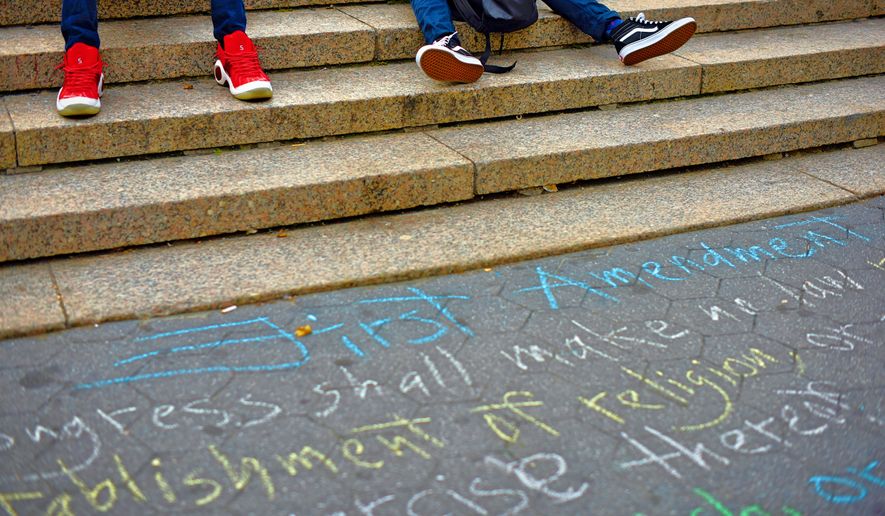U.S. high school students support First Amendment protections for “unpopular” free speech but feel increasingly uncomfortable with allowing “offensive” opinions, according to a survey released Tuesday.
Nearly 9 in 10 student respondents (89%) to the Knight Foundation survey said that “people should be allowed to express unpopular opinions” under the Constitution.
That level of support has stayed consistent since Knight started polling high school students in 2004, the nonprofit group said.
“Our findings show students still want to be exposed to a wide range of opinions and ideas, and are comfortable voicing disagreement in class,” Evette Alexander, Knight’s director of learning and impact, said in an email.
But only 40% said that “people should be allowed to say whatever they want in public, even if what they say is offensive to others.” That’s down from 45% in Knight’s surveys in 2016 and 2018.
“Perhaps it reflects disdain for personal bullying, something that age group undoubtedly experiences in person or on social media all the time,” Bruce Hausknecht, a policy analyst at the conservative Focus on the Family, said in an email.
“Nevertheless, given our culture’s drift toward calling every unpopular opinion ‘offensive’ to someone, the study reveals a potential weakness in attitudes of that age group that could impact free speech going forward,” Mr. Hausknecht added.
Knight’s survey is the eighth in a research series on high school students’ attitudes toward free speech and the First Amendment.
“In every survey we have conducted since 2004, we found that students who have taken classes that include First Amendment content tend to be more supportive of free speech rights than those who have had no such coursework,” Knight states in a summary of this year’s findings.
“Students in racial minority groups, women and non-binary students are less likely to feel they are protected by the First Amendment than white and male students,” the summary adds.
Knight reported that high school students of all backgrounds have become more sensitive to offensive language in recent years amid the COVID pandemic, racial justice protests and school curriculum battles.
This year’s survey found that 56% said they support the rights of musicians to “sing songs with offensive lyrics.” That’s down from 66% of survey respondents in 2018 and 70% in 2004.
However, 57% said news organizations should be able to “publish without government censorship,” and 59% said the same of people posting on social media.
In addition, 60% said they believe teachers or administrators should not be able to punish them for social media posts.
Laura Linn Knight, an Arizona-based parenting coach, said the survey confirms that “not all teenagers feel safe expressing themselves.”
“It is important for teenagers to have the right to express themselves and be protected and safe,” Mrs. Knight said. “This is critical for their brain development, connections within communities [and] potential for making positive changes.”
The Knight Foundation funds community, journalism and arts grants. It said it conducts the “Future of the First Amendment” survey to inform schools about students’ views on free speech.
Using questionnaires, Knight surveyed 10,098 high school students from November 2021 to February 2022. The margin of error was plus or minus 1 percentage point at the 95% confidence level.
• Sean Salai can be reached at ssalai@washingtontimes.com.




Please read our comment policy before commenting.